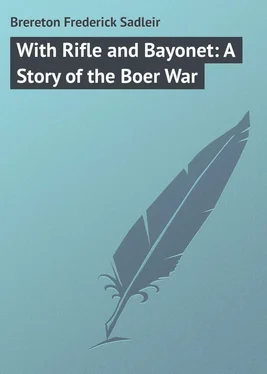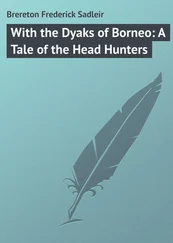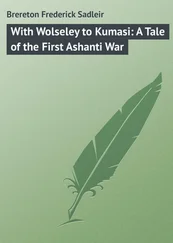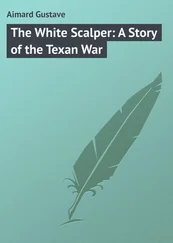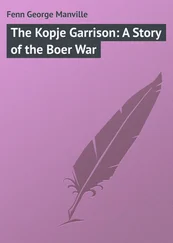Frederick Brereton - With Rifle and Bayonet - A Story of the Boer War
Здесь есть возможность читать онлайн «Frederick Brereton - With Rifle and Bayonet - A Story of the Boer War» — ознакомительный отрывок электронной книги совершенно бесплатно, а после прочтения отрывка купить полную версию. В некоторых случаях можно слушать аудио, скачать через торрент в формате fb2 и присутствует краткое содержание. Жанр: foreign_prose, foreign_children, на английском языке. Описание произведения, (предисловие) а так же отзывы посетителей доступны на портале библиотеки ЛибКат.
- Название:With Rifle and Bayonet: A Story of the Boer War
- Автор:
- Жанр:
- Год:неизвестен
- ISBN:нет данных
- Рейтинг книги:5 / 5. Голосов: 1
-
Избранное:Добавить в избранное
- Отзывы:
-
Ваша оценка:
- 100
- 1
- 2
- 3
- 4
- 5
With Rifle and Bayonet: A Story of the Boer War: краткое содержание, описание и аннотация
Предлагаем к чтению аннотацию, описание, краткое содержание или предисловие (зависит от того, что написал сам автор книги «With Rifle and Bayonet: A Story of the Boer War»). Если вы не нашли необходимую информацию о книге — напишите в комментариях, мы постараемся отыскать её.
With Rifle and Bayonet: A Story of the Boer War — читать онлайн ознакомительный отрывок
Ниже представлен текст книги, разбитый по страницам. Система сохранения места последней прочитанной страницы, позволяет с удобством читать онлайн бесплатно книгу «With Rifle and Bayonet: A Story of the Boer War», без необходимости каждый раз заново искать на чём Вы остановились. Поставьте закладку, и сможете в любой момент перейти на страницу, на которой закончили чтение.
Интервал:
Закладка:
“At the same time, too, the English Government handed over the Orange Free State to the settlers there, and the two young Republics started into being, the one with Mr Boshof as president, and the other with Pretorius.
“There you have the history of our neighbours. But before passing on to tell you about the first Boer war, in which I myself took a part, I must mention that the Basutos, who have their country wedged as it were into the Free State, had constant conflicts with the Boers. They are now happy and contented under our own rule, but they bear an undying hatred for their neighbours which at any time may lead to further troubles.
“And now, my boys, to get to more recent times, that is to say, the past twenty years or so. We have, as I have endeavoured to show you, two Boer republics adjacent to one another, and only sparsely populated. South of them are Cape Colony and Natal, also populated by Dutchmen and blood relations of the Boers, while amongst them are many British settlers.
“I have told you how our neighbours dealt with their native servants. Now that they had been given their independence they were free to do as they liked, save that slavery would not have been permitted. But, to the Boer, native labour is everything. His one aim and object in life is to live at peace with all the world, to possess vast stretches of country which shall be all his own, and in the heart of which he may bury himself away from the world, troubling only to till by means of native servants sufficient land to supply his wants, and devoting himself to the rearing of cattle. His daily routine of life since independence was assured was to rise with the lark, and ride round his lands counting his herds of cattle. That done he was at leisure all the rest of the day. His life was simplicity itself; the gaieties and amusements of cities, and social intercourse with other men, never upset the serenity of his existence. His soul longed to be free of them all. He was at last, and determined to be to his dying day, king of the stretches of plain he owned. No one should oust him from them, and for his happiness it only sufficed that he should live alone with his own family, sit the livelong day upon the stoep (step) of his farmhouse, drinking coffee and smoking incessantly, while he gazed listlessly across the waving grass and veldt, and busied himself with thoughts the nature and depth of which could not be great.
“Dressed in rough cloth coat and trousers, and with a dilapidated slouch hat upon his head, he never troubled to discard his clothing. His beard and hair were seldom trimmed, and his toilet was a matter of which he never thought.
“But all the while, though nothing seemed to stir him from his lazy life, the mere suspicion that his dearly-cherished independence was in danger brought him to tear himself away from his peaceful farm, and, rifle in hand, to place himself shoulder to shoulder with his brother Boer to fight for the Republic.
“For twenty years the Boers maintained a constant succession of disputes as regards the frontiers of the Transvaal. Now it was with the Orange Free State, and at another time with the English. But at last they picked a quarrel with Sekukuni, whose country lies to the northeast of us, and this led to open warfare.
“Now, all along I have given our neighbours credit for staunch and dogged pluck, though I am bound to confess that their constant association with the natives has taught them dishonest and treacherous habits. But to be really brave our friends must lie behind the rocks. It is against their nature to fight when exposed in the open. True guerilla warfare is their motto; to shoot down the enemy unawares, and without showing so much as a finger.
“For defence these tactics are excellent, but for attack quite useless. Sekukuni and his followers proved too much for the Boers. Hidden in caves from which nothing but a frontal attack and absolute disregard of danger could dislodge them, they laughed at our neighbours, who were far too careful of their own safety to make a rush.
“The Boers were forced to retire, but only to face more troubles. To live in idleness and ease is not to make the wherewithal with which to support a government. Their public money ran out, their coffers were empty, and hordes of natives pressed upon their borders.
“In this predicament, when only 12 shillings 6 pence remained to their credit, the British Government stepped in again, for we could not afford to allow the Zulus to become possessed of land close to our colonies, and on April 12th, 1877, Sir Theophilus Shepstone annexed the Transvaal. Troops were despatched against Sekukuni, and he was beaten; and to follow it up, we entered upon hostilities with the Zulus, the hereditary foe of the Boers, and after some terribly trying work, broke the power of the notorious Cetewayo. Rorke’s Drift and Ulundi are names which will never be forgotten at home, and Isandhlwana will for ever be spoken of with bated breath.
“After annexing the country we garrisoned the different towns, and all went well for a time. But, though the better-educated Boers had looked kindly at our government, the ignorant, narrow-minded, and pig-headed peasants thought only of their independence. Once the much-feared Zulus had been crushed, their debts paid, and their finances put in order, they forgot their gratitude to us, and longed to be free again. And, mind you, my boys, they did not shout or brawl about it. They worked sullenly and in secret, as a result of which they determined upon revolt against their English masters.
“They elected a provisional Boer Government, with Kruger, Joubert, and Pretorius at the head, and opened their rebellion by attacking a convoy and escort of our soldiers from Lydenburg to Pretoria at Bronkers Spruit.
“It was a detestable affair. They ordered Colonel Anstruther, who was in command, to halt and turn back. He persisted in obeying his orders, and in a moment, from the hills around, the Boers poured in a terrific fusilade, picking off officers first and men last like so many sheep. The remainder they took prisoners, compelling them to take the places of the slaughtered oxen and drag the wagons to Pretoria.
“To cap all this they foully murdered Captain Elliot, one of two officers to whom they had given permission to leave the country, and whom they drove into the river Vaal when in flood, pouring volleys into them as they struggled in the water.
“And now to tell you of my own part in the affair,” said Mr Hunter. “But first of all, pass me another cigar, Jack, and shout to Tom Thumb for some more of this stuff. It’s rather dry work giving you a yarn of this length.”
Tossing away the stump of his old cigar, Mr Hunter carefully selected another, and having lit it and gulped down a few mouthfuls of lemon-squash, he placed his feet on the rail of the verandah, leant back in his comfortable chair, and proceeded with his narrative.
“Wilfred knows all about it, of course,” he commenced, “but I dare say you’ll be surprised to hear, Jack, that I was once a soldier of the Queen. That is to say, I was a gunner with my battery in Africa when the Boer troubles first began. I look comfortable and fat enough now, I think you’ll agree, and I’m doing as well in the world as I could wish; but the fact remains that I was once a soldier. I had been a reckless and restless lad at home in England, and rather than settle down in trade as a grocer’s assistant, I donned the queen’s uniform. And let me tell you, my boys, the army is by far the best place for all such youngsters as I was. It’s a kind of big school where those who like can climb up the rungs of the ladder, and find themselves, when they go back to civil life, in far better positions than they might otherwise have occupied. It does not matter who or what you were before you ’listed; it’s each for himself, and it is the smart, sober lad, who is respectful and knows his work, who gets promotion to the non-commissioned rank.
Читать дальшеИнтервал:
Закладка:
Похожие книги на «With Rifle and Bayonet: A Story of the Boer War»
Представляем Вашему вниманию похожие книги на «With Rifle and Bayonet: A Story of the Boer War» списком для выбора. Мы отобрали схожую по названию и смыслу литературу в надежде предоставить читателям больше вариантов отыскать новые, интересные, ещё непрочитанные произведения.
Обсуждение, отзывы о книге «With Rifle and Bayonet: A Story of the Boer War» и просто собственные мнения читателей. Оставьте ваши комментарии, напишите, что Вы думаете о произведении, его смысле или главных героях. Укажите что конкретно понравилось, а что нет, и почему Вы так считаете.
